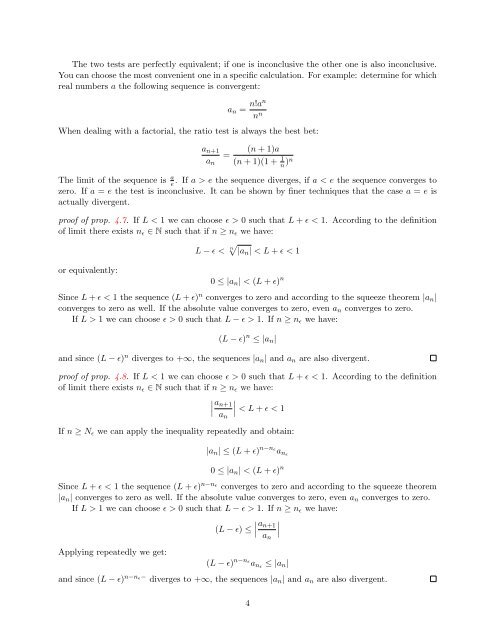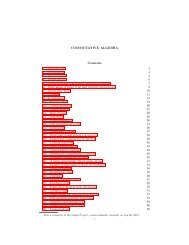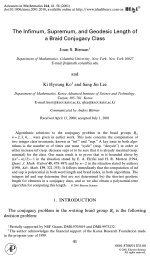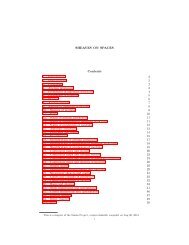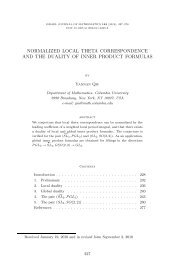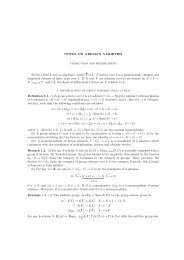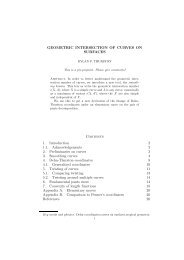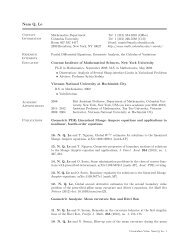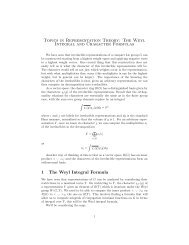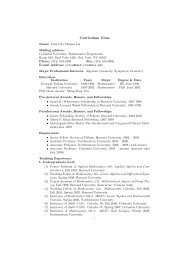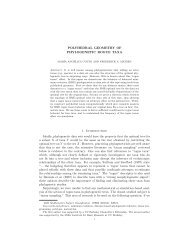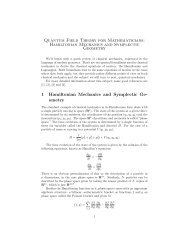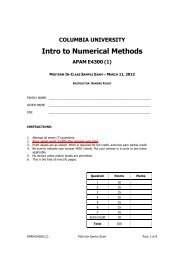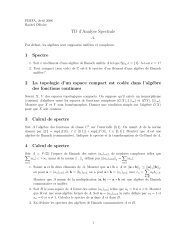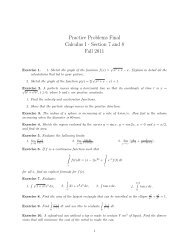Sequences CheatSheet
Sequences CheatSheet
Sequences CheatSheet
You also want an ePaper? Increase the reach of your titles
YUMPU automatically turns print PDFs into web optimized ePapers that Google loves.
The two tests are perfectly equivalent; if one is inconclusive the other one is also inconclusive.<br />
You can choose the most convenient one in a specific calculation. For example: determine for which<br />
real numbers a the following sequence is convergent:<br />
an = n!an<br />
n n<br />
When dealing with a factorial, the ratio test is always the best bet:<br />
an+1<br />
an<br />
=<br />
(n + 1)a<br />
(n + 1)(1 + 1<br />
n )n<br />
The limit of the sequence is a<br />
e . If a > e the sequence diverges, if a < e the sequence converges to<br />
zero. If a = e the test is inconclusive. It can be shown by finer techniques that the case a = e is<br />
actually divergent.<br />
proof of prop. 4.7. If L < 1 we can choose ɛ > 0 such that L + ɛ < 1. According to the definition<br />
of limit there exists nɛ ∈ N such that if n ≥ nɛ we have:<br />
or equivalently:<br />
L − ɛ < n |an| < L + ɛ < 1<br />
0 ≤ |an| < (L + ɛ) n<br />
Since L + ɛ < 1 the sequence (L + ɛ) n converges to zero and according to the squeeze theorem |an|<br />
converges to zero as well. If the absolute value converges to zero, even an converges to zero.<br />
If L > 1 we can choose ɛ > 0 such that L − ɛ > 1. If n ≥ nɛ we have:<br />
(L − ɛ) n ≤ |an|<br />
and since (L − ɛ) n diverges to +∞, the sequences |an| and an are also divergent.<br />
proof of prop. 4.8. If L < 1 we can choose ɛ > 0 such that L + ɛ < 1. According to the definition<br />
of limit there exists nɛ ∈ N such that if n ≥ nɛ we have:<br />
<br />
<br />
< L + ɛ < 1<br />
an+1<br />
an<br />
If n ≥ Nɛ we can apply the inequality repeatedly and obtain:<br />
|an| ≤ (L + ɛ) n−nɛ anɛ<br />
0 ≤ |an| < (L + ɛ) n<br />
Since L + ɛ < 1 the sequence (L + ɛ) n−nɛ converges to zero and according to the squeeze theorem<br />
|an| converges to zero as well. If the absolute value converges to zero, even an converges to zero.<br />
If L > 1 we can choose ɛ > 0 such that L − ɛ > 1. If n ≥ nɛ we have:<br />
<br />
<br />
(L − ɛ) ≤ <br />
Applying repeatedly we get:<br />
an+1<br />
an<br />
(L − ɛ) n−nɛ anɛ ≤ |an|<br />
and since (L − ɛ) n−nɛ− diverges to +∞, the sequences |an| and an are also divergent.<br />
4


